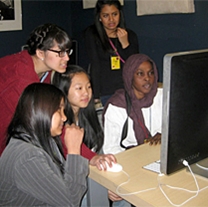Grant Spotlight | December 12, 2013
Share This |
 |
Grantee Grant |
Contact Website
|
“This program targeted an underserved population, emphasizing the importance of their voice, their story, their world. Beyond giving the teens a voice, it gave them a positive place to be after school; it exposed them to new technologies; and it offered a fun, collaborative place to play and create."
– Nyssa Fleig, Salt Lake County Library Services Acting Branch Manager
A Salt Lake County student from Nepal found his passion in filmmaking last year and went on to produce a documentary about the refugee experience that was screened at a Utah refugee conference. Brand new to the U.S., he spoke very little English and had no multimedia experience when a local community organization recruited him to the free program, Speak Up! Multi-Media Storytelling for Refugee Students.
Utah is home to about 35,000 refugees, with some 1,000 new refugees arriving each year; 97 percent of this population resides in Salt Lake County. Many of these refugees are school-aged teens. To meet the growing need to support its new neighbors, Salt Lake County Library Services (SLCLS) designed a program for refugee teens in local high schools. It gives them a voice in the community and an outlet to tell their stories.
The project was launched through the IMLS Grants to States program in partnership with Spy Hop. An arts and humanities nonprofit, Spy Hop’s digital media programs teach critical digital skills and promote positive relationships, civic awareness, 21st century life skills, and creativity. The project included a free six-week course at several community centers and schools, where 30 students from countries such as Ethiopia, Nepal, Tanzania, DRC, and Sudan learned introductory video, animation, and music skills and created stories about themselves, their lives, their families, and their communities. The program culminated in a red-carpet screening of students' films at the library system’s Viridian Event Center. In the process, the refugee students learned how to use digital media as a way to share their stories.
Growing Technology Skills and Passion
In addition to providing free courses and transportation for students, the grant allowed the library to purchase twelve iPad tablets for this project—the first SLCLS program focusing this heavily on multimedia. Every one of the refugee students who participated in the program were exposed to new technologies, from basic computer software to animation programs, allowing students to create their own videos and graphics.
SLCLS is now able to offer additional multimedia programs. The tablets are available for use in other programs, and libraries offer multimedia classes across skill levels to encourage local patrons to harness the power of e-learning, creative tools, and hands-on, interactive applications.
Spy Hop’s Marketing and Community Programs Director Virginia Pearce observed the direct impact of the courses for the refugee students. “This program offered a chance to work with youth who don’t often have access to any kind of technology, and a chance to really think about their story and the way they would want to tell it,” she said. A student from Ethiopia featured her new Salt Lake City community in her video, describing the Ethiopian refugee population’s support for one another in a new country they now appreciatively call home.
Class instructor Shanalee Otanez noted universal excitement from the students about making music and videos and interacting with one another. She said, “Students lit up when working with the technology, and each session was filled with laughter and discussion.” Many participants commented that the program was their favorite part of being in the U.S. so far, and several went on to take additional classes with Spy Hop.
A Ripple Effect
This program had a far-reaching effect as a way for Salt Lake County Library Services to demonstrate its determination to serve the refugee community. As SLCLS’s first endeavor to reach out directly to the refugee community, the program established local libraries as a valuable resource. The project has opened doors for more opportunities for SLCLS to establish partnerships, and even more opportunities to serve the refugee community.
The library system has continued and expanded its relationship with the refugee population, hosting book club discussions centered on the refugee experience and cultivating partnerships with community centers and local schools. SLCLS is now a partner in Global Community Summit, a five-day event engaging diverse members of the community in Utah to identify solutions for preserving diversity for individual groups, using common themes to enhance communication between different groups, and serving as a foundation for building an integrated community. As regional organizations create initiatives to engage with refugee residents, SLCLS is included in these conversations.
Bridging the Larger Community
As a result of the project, SLCLS has forged key connections with organizations that serve local refugee populations, such as Sunnyvale Neighborhood Center and the United Way. Cottonwood High School, which offers an English immersion program and helped SLCLS recruit participants for the program, continues to collaborate with the library system. Additionally, Spy Hop and SLCLS teamed up again for Teen Tech Month at library branches.
The program and these resultant linkages have broadened awareness of resources for the refugee community, and also provided opportunities for Salt Lake County residents to learn about their new neighbors. The project united diverse groups and gave voice to a previously hidden population in Utah. It reinforced the power of storytelling, the value of technology literacy, and the essential role of libraries as anchors in education and community engagement.
